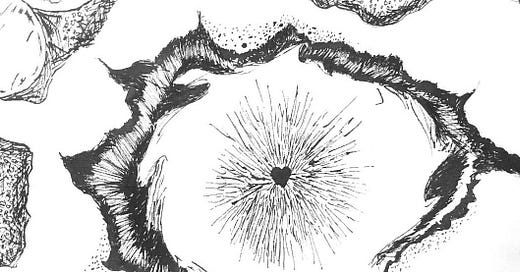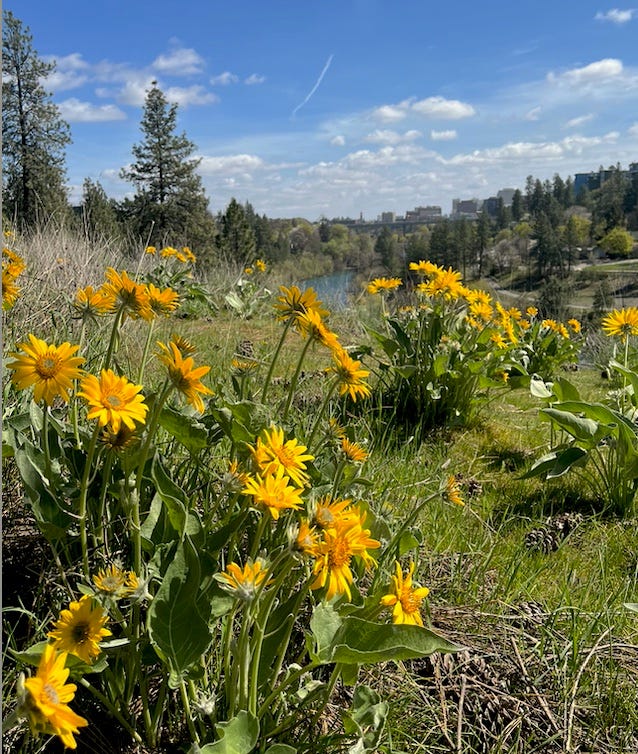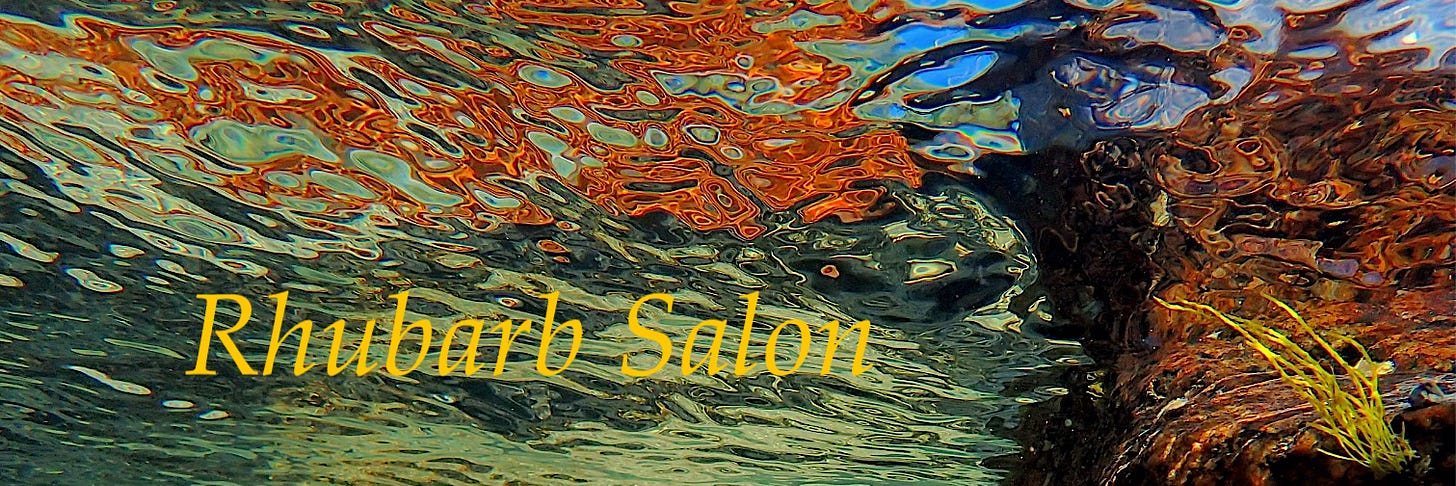Love, hope, fear and hard truths
First off, thanks for your patience over the past five weeks. I snuck back into Spokane a week ago, between extended trips to Tacoma and Denver where I’ll be heading, later this morning, to visit family and attend a memorial. I’ll be more fully back to writing next week.
My old friend C.R. Roberts is well-entitled to any fragments of grace and discretion my care-giving affords. But he won’t mind me cheerfully reporting that he’s recovering well from open heart surgery, steadily regaining his footing and strength. He never lost his sense of humor through the ordeal, which included having to endure my efforts to sing and cook for him.
The best part of my prolonged stay was greeting people at his door—not just the visiting nurses and therapists but a parade of guests from all walks of life who arrived with food, encouragements and memories to share. The stories were captivating and laughter crackled like a good fire. I joked to C.R. that we should be hosting a talk show right there in his small living room in southeast Tacoma where he was holding court in a new lift chair friends had delivered the day before I brought him back from the hospital.
Until he retired a few years ago, C.R. was a reporter and columnist with the Tacoma News Tribune. In addition to being a gifted story teller, he’s a humanitarian who (still) gives time and energy to needy kids as far away as the Balkans and central Asia. Without fanfare he shows up for people, his community, and the world as he knows it. Over the years he’s collected a wide range of souvenirs, including decades-old menus from the golden age of air travel. He is fond of classic texts and films, and favors sharp, Irish cheddar, among other cheeses.
The second best part of being there, as spring arrived, was driving him around town. He grew up in Tacoma and, as the designated passenger, he guided our outings with memories and stories, punctuated with directions on where to turn and what lane to be in. His two-story cottage on Bell Street is within sight and sound of Pacific Avenue, which cuts through a working class neighborhood not far from Tacoma’s former train station, now a federal courthouse, and the nearby Museum of Glass, home base for the surreal works of native son Dale Chihuly.
His block on Bell Street is lined on both sides with mature plum trees, the fruits from which I’ve enjoyed when visiting him in mid-summers past. The flowers were coming into bloom in early March and because I parked my 2001 Honda out front it was constantly covered with blankets of pear blossoms. When I would drive off to do errands (often with C.R. on board) the damp blossoms would dry and then take flight in a trail behind the car, as though I was piloting a float in the Lilac Parade. I liked how that felt, a visitor from the other side of the mountains, leaving a contrail of small, pink flowers as I drove my son’s godfather around his hometown.
If you’ve read Beautiful Wounds, you will know I’ve struggled with heartbreak and depression. (That doesn’t make me special in any sense, as the cohort of heartbroken, depressed people is not small). Producing the book was therapeutic but any notion that I’ve somehow outlived grief would be untrue. In a psyche-survival kit, a sense of humor is on the top rack, next to the gauze. I often reach for the clarifying question Ed Harris (playing the role of legendary NASA Flight Director Gene Kranz) delivers in the 1995 film Apollo 13. As chaos ensues in the aftermath of the oxygen tank explosion that nearly destroyed the spacecraft Harris asks his team: “what have we got on the spacecraft that’s good?”
Let’s me put a pin on that, for now.
No matter what lens we use these are not good times. For reasons previously expressed, the Biden Administration’s months-long support for the Israeli demolition of Gaza has made ordinary Americans complicit in atrocities through our taxes. Distance is no salve, as it does nothing to exonerate the cruelty and starvation. The sadness that accompanies what we see to be true is as dispiriting as it should be. This tragedy unfolds as our country already has its hands full with a populist movement that would replace democracy with an authoritarian regime. It is anguish on top of anguish, the sort we experience both personally and collectively.
The American ideal—the mainsail of the Enlightenment—only exists to the extent that a healthy majority of us are committed to equal rights and opportunities not just for ourselves but for each other. This includes the right to have our votes matter and the votes of people who disagree with us matter. It is the essence of the pledge of allegiance—“liberty and justice for all”—that we recite in elementary schools. It’s not an abstraction and it happens to be the antithesis of Trumpism. We can’t love each other without standing up for others whose dignity matters and whose voices deserve to be heard.
I got involved in journalism and social/environmental justice issues in my early twenties for the same reasons that young people join the Peace Corps. Journalism has been described, passively, as the first draft of history. But in the present-tense it is essential to creating and sustaining healthy democracies, at all levels. It is why despots murder reporters. To be sure, journalism is kinetic and inherently abrasive. Because it has to be. Ours is a society awash in commercial and political speech largely devoted to selling things that are often as unhealthy as they are illusory. Journalists have a duty to our neighbors, our fellow citizens, to ask uncomfortable questions, and do so in the public interest.
In the late 1800s, the columnist and humorist Finley Peter Dunn famously wrote that the job of journalism is “to afflict the comfortable and comfort the afflicted.” That’s a good approximation, one which Trumpism has managed to turn on its head, with Trump igniting and now refueling a strain of rage-populism by persuading millions of Americans that being civil and empathetic is too “woke,” and that journalists are the true enemy of the people.
The word “movement” barely describes it. Trumpism is a personality cult—knitted with divisiveness and intolerance—that has taken over one of our two, major political parties. It is a movement with a cynical propaganda component that was plainly exposed (to anyone who cared to look) in the Dominion Voting Systems v. Fox News litigation. In sum, Trumpism has done to our democracy what the Covid epidemic did to our collective health. A decade ago it was hard to imagine that millions of Americans would support a major party candidate who openly promises to end our democracy. Today it’s not hard to imagine at all. It is upon us and all around us.
Three days ago I couldn’t help but notice how quickly an insightful work of journalism was captured, on the fly, as a historical benchmark. It came in this dispatch from historian Heather Cox-Richardson as part of her daily “Letters from an American” series. She illuminated an extraordinary interview that ABC’s This Week host George Stephanopoulos conducted last Sunday with New Hampshire Governor Chris Sununu. Sununu is a popular Republican and the son of John Sununu, himself a former governor but perhaps best known as President George H.W. Bush’s staunchly conservative chief of staff. Until former South Carolina Governor Nikki Haley ended her campaign a month ago, Sununu was publicly supporting Haley’s challenge to Trump for the Republican Presidential nomination.
As Richardson recognized and pointed out in her dispatch, what makes the Stephanopolous/Sununu interview so disturbing is not that Sununu is now proclaiming his support for Trump’s candidacy, but that he clearly knows better. He doesn’t dispute that Trump is unfit to be President. His reasoning is that the overriding imperative in this year’s election is to restore Republican control of the executive branch so as to reward the party’s culture warriors and “pro-business” donors. Sununu is willing to support Trump because, ultimately, it all boils down to politics and Trump’s overwhelming popularity with the Republican base. The interview concludes with this last exchange:
Stephanopolous: “So just to sum up, you support him for president even if he's convicted in classified documents, you support him for president even though you believe he contributed to an insurrection, you support him for president even though you believe he's lying about the last election, you support him for president even if he's convicted in the Manhattan case. I just want to say the answer to that is yes, correct?”
Sununu: “Yeah, me and 51% of America.”
Perhaps we should all be grateful for Sununu’s honesty—that he didn’t recant his previous and brutal assessments of Trump’s unfitness to hold office while, at the same time, endorsing him. Still, it’s shocking to hear it out loud—the bare admission that power is more important than character, more important than democracy itself. I was raised Catholic and taught the names of the sins. I don’t what the name would be for this sin, but it wouldn’t be venial and it should have to rhyme with treason.
I want to believe our children and grandchildren are the answer to our version of the Apollo 13 question—what have we got on the spaceship that’s good?
What Heather Cox Richardson (and others) rightly picked up on is what the Sununu interview reveals about how tenuous American democracy is now—how something that so recently seemed irrevocable and unshakable is suddenly so vulnerable to repeal. As the New York Times reported in late December, it’s happening in broad daylight. Trump’s cadre of advisors already have a plan to transform the executive branch—including the Department of Justice—into a partisan weapon to punish Trump’s opponents. Trump’s open pledge of “retribution” if he wins weighs not just on his political opponents but on corporations who have good reason to fear retaliation if they choose not to donate to Trump’s campaign.
The American ideal—the mainsail of the Enlightenment—only exists to the extent that a healthy majority of us are committed to equal rights and opportunities not just for ourselves but for each other. This includes the right to have our votes matter and the votes of people who disagree with us matter. It is the essence of the pledge of allegiance—“liberty and justice for all”—that we recite in elementary schools. It’s not an abstraction and it happens to be the antithesis of Trumpism. We can’t love each other without standing up for others whose dignity matters and whose voices deserve to be heard.
Despite the predictable slippage caused by Joe Biden’s moral blindspot to the Gaza tragedy, there are signals that younger Americans embrace democracy more tightly than older Americans. Recent polling bears that out. I want to believe our children and grandchildren are the answer to our version of the Apollo 13 question—what have we got on the spaceship that’s good? In the broader sense: who are the patriots in our midst to who can make the difference as we try to resist and overcome a precarious slide toward authoritarianism? I choose to believe it is our emerging generations—their souls as much as their intelligence—that will get us through this, that will get us home.
And, speaking of home…
For years, now, my respite from stress and the sads has been to grab a camera and find reasons to be in a places where I can’t be easily reached. As the spring progressed in Tacoma (which is beautiful and verdant and dotted with daffodils) I began to lament that—for the first time in a couple decades—I would miss the first, inspiring explosions of wild balsamroot and serviceberry blooms that mark spring in eastern Washington.
I was wrong about that. And happily so.
—tjc









"what have we got on the spaceship that’s good?"
Thank you, Tim. Let's keep asking, and answering, that question.
Always thought provoking & spot on.